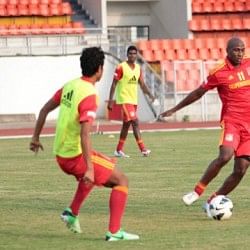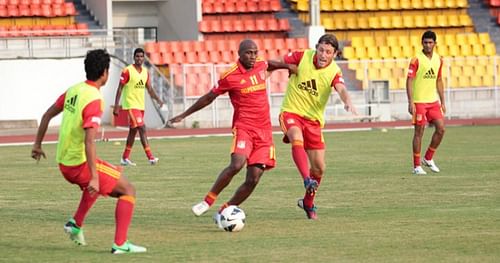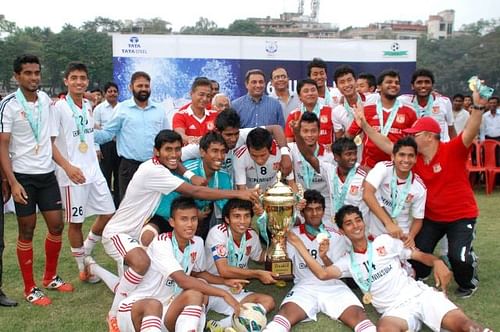
Now in the Champions League, Pune FC continues to be the benchmark for I-League clubs

Lack of professionalism has been hurting Indian football over the years. While other countries in Asia have moved forward both on and off the field, India remains a sleeping giant. The All India Football Federation gets most of the stick for India’s lack of progress in world football but the I-League clubs are equally responsible.
A proof of the clubs’ shortcomings was seen back in August when all the teams failed in the club licensing test. So it’s not surprising to see the poor state of the I-League because the clubs don’t have their own house in order.
But Pune FC stands out as an exception, like they did in the test as on appeal they were granted the national and AFC license. They don’t have the history and fanbase of the popular Kolkata clubs but Pune FC have shown that it is possible to run an Indian football club in a professional way.
They are widely considered to be the best-run club in the league and the license has now earned them a qualifying playoff berth in the 2014 Asian Champions League. They will become the first Indian team to play in the continent’s biggest club competition since 2011 because of their merits both on and off the field. Thus there is another reason to suggest that Pune FC are an example for other I-League clubs to follow but the Red Lizards want to keep reaching newer heights.
“Ever since the club was formed the target has been to play in Asian competitions so getting a berth in the playoff stage of the Champions League is a great day in our history but we don’t want to stop here,” Pune FC’s head operations Chirag Tanna told Sportskeeda after the historic announcement on Tuesday.
Formed in 2007, Pune FC haven’t been spending heavily on their first team to get short-term success but instead have taken youth development very seriously. While clubs like Mohammedan Sporting and East Bengal, who have been around for so many generations now, don’t have an academy, Pune FC have already set up their very own academy that has top-class facilities.
Their academy has been producing winners in the under-20 I-League for the last two seasons and many of the academy graduates like Nikhil Kadam now also play for the senior team. It’s not that Pune FC don’t want to be successful with their first team and in fact have been very consistent since their promotion to the top flight back in 2009, finishing in the top five in each of the four seasons .
The owners of the club, the Ashok Piramal Group, like any other owner craves for silverware but don’t want to spend unnecessarily on players which has been a worrying trend in Indian football. With no financial return from the I-League, the big spending sounds all the more ridiculous while Pune FC’s long-term target of producing the majority of their first-team players through their own academy makes perfect sense.

Pune FC have the best youth development program in India
“Winning major trophies was always our target right from the start and that should be the aim for any team that takes part in any sport and in any tournament. However, we need to have a right balance in our budget and can’t spend entirely on the senior team. Otherwise, there would be no difference between PFC and other clubs,” former India cricketer Rohan Gavaskar, who is close friends with the Piramal family and also a stakeholder at Pune FC, told Sportskeeda in an interview back in June.
“We invest a lot on our youth teams and won the U-20 I-League twice in a row. We have a very good youth development program and I am sure that will reap the benefits in the near future,” the junior Gavaskar added.
Because of this sensible financial model Pune FC unlike most other clubs of the I-League don’t fail to pay the players on time and always respect contracts but their professionalism goes beyond the daily football activities. Whether it’s having a regular video analyst or broadcasting their non-televised matches online or having an annual club awards night, Pune FC are fulfilling almost all the duties of a professional football club.
A berth in the Asian Champions league qualifying playoffs is the result of some real hard work put in by everybody at the club over the last six years and it should enhance their growing brand.
“Yes, this slot in the Champions League should help increase our fanbase too because you get global attention when you play in such a tournament so we are all very proud,” Tanna added.
Several challenges lie ahead for PFC, like building their own stadium but as of now they are on the right track and have made immense progress over the last six years.
It remains to be seen whether they can become the first Indian club to play in AFC Champions League group stage but there is no doubt that Pune FC continues to be the benchmark for the rest of the I-League.